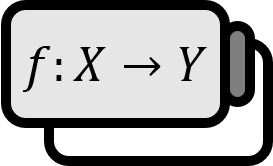Limits of Exponential and Logarithmic Functions
Formulas
Exponential functions and logarithmic functions satisfy the following equations.
$$ \begin{equation} \lim \limits_{x \to 0} \dfrac{\log (x + 1) }{x} = 1 \end{equation} $$
$$ \begin{equation} \lim \limits_{x \to 0} \dfrac{ e^{x} - 1}{x} = 1 \end{equation} $$
Proof
$(1)$
$$ \begin{align*} \lim \limits_{x \to 0} \dfrac{\log (x + 1) }{x} &= \lim \limits_{x \to 0} \dfrac{1}{x} \log ( x + 1) \\ &= \lim \limits_{x \to 0} \log (x + 1)^{\frac{1}{x}} \\ &= \log\left( \lim \limits_{x \to 0} (x + 1)^{\frac{1}{x}}\right) \\ &= \log\left( e \right) \\ &= \log\left( e \right) \end{align*} $$
The third equality holds because the logarithmic function is continuous. The last equality is due to the definition of $e$
■
$(2)$
If we substitute as $e^{x}-1 = t$, then it follows that $x = \log(t+1)$
$$ \begin{align*} \lim \limits_{x \to 0} \dfrac{ e^{x} - 1}{x} &= \lim \limits_{t \to 0} \dfrac{ t }{ \log (t+1)} \\ &= \lim \limits_{t \to 0} \dfrac{ 1 }{ \frac{1}{t}\log (t+1)} \\ &= \dfrac{\lim \limits_{t \to 0} 1 }{\lim \limits_{t \to 0} \frac{1}{t}\log (t+1)} \\ &= \dfrac{1}{1} = 1 \end{align*} $$
The third equality holds because of $\lim \dfrac{f}{g} = \dfrac{\lim f}{\lim g}$. The fourth equality is due to $(1)$.
■
